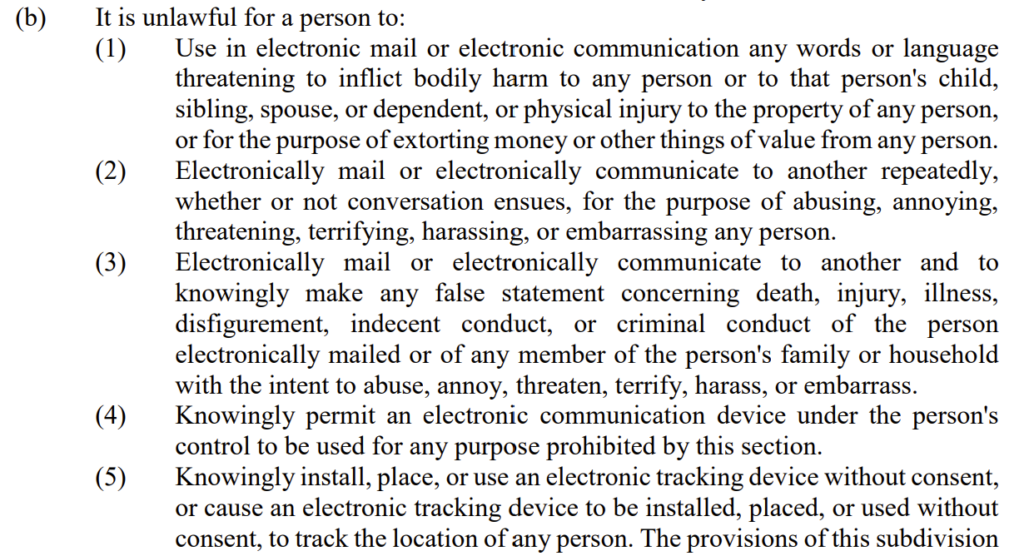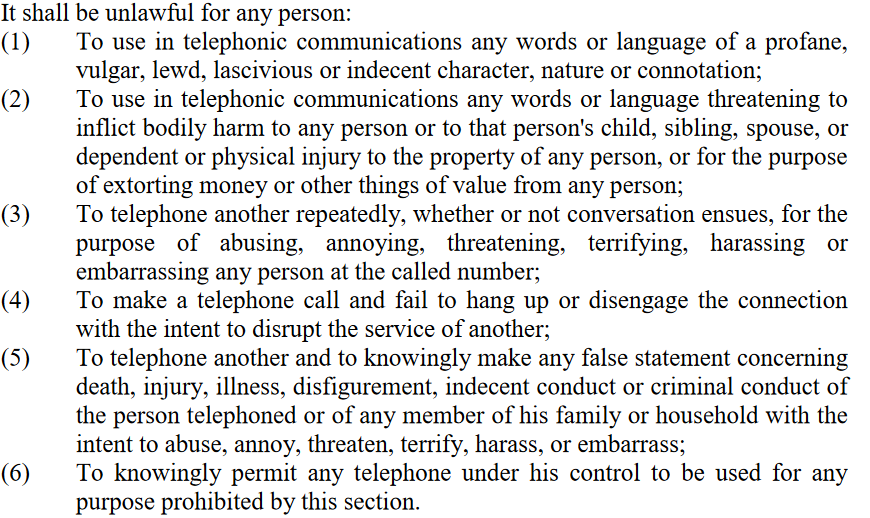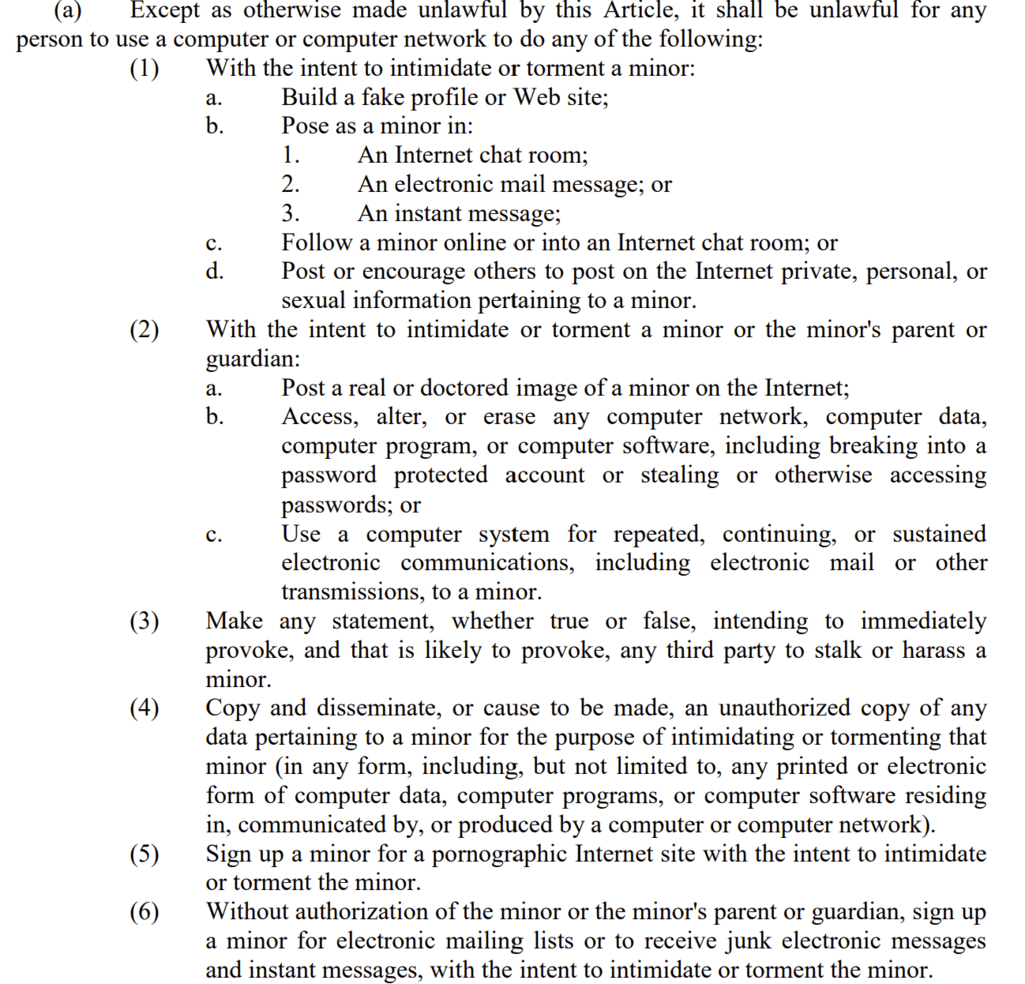Is Doxxing Illegal In NC?
Laura Martisiute
Reading time: 6 minutes

Table of Contents
As the number of doxxing cases grows every day in the state and elsewhere, North Carolina residents might wonder: Is doxxing illegal in North Carolina?
In this guide, we’ll look at the legality of doxxing in North Carolina, along with crimes often associated with it.
Is Doxxing Illegal in North Carolina?
No. Doxxing, or sharing someone else’s personal information without permission, is not expressly illegal in North Carolina.
Doxxing Related Activities That Are Illegal In North Carolina
Even though doxxing is not expressly illegal in North Carolina, there are numerous crimes that can happen as a result of doxxing that are. If you’re concerned about being doxxed, you should be aware of how they can come into play.
In North Carolina, these crimes include stalking, cyberstalking, communicating threats, phone harassment, cyberbullying, and extortion.
Stalking
Stalking (North Carolina General Statute § 14-277.3A) in North Carolina is defined as repeatedly harassing another person to the point that the victim fears for their personal safety or the safety of their family.
The charge can also be applied if a victim feels substantial emotional distress due to fear of impending death, injury, or continued harassment as a result of the perpetrator’s actions.

Someone charged with stalking in North Carolina faces a class A1 misdemeanor, which comes with up to 150 days in jail and a discretionary fine.
Cyberstalking
In North Carolina, cyberstalking (North Carolina General Statute § 14-196.3) involves using electronic communication to abuse, threaten, harass, or track another person.
Specifically, the law prohibits a) electronically threatening a person or their family with bodily harm, injury to their property, or extortion, b) repeatedly communicating with someone electronically to abuse, annoy, threaten, harass, or embarrass them, and c) communicating electronically with a person to make false statements about death, injury, illness, or similar to annoy, abuse, or threaten them.
It is also illegal under this law to place an electronic tracking device on a person without their consent (with some exceptions).

Those found guilty of cyberstalking in North Carolina are charged with a class 2 misdemeanor, amounting to up to 60 days in jail and/or a $1,000 fine.
Communicating threats
While similar to stalking and cyberstalking, the charge of communicating threats (North Carolina General Statute § 14-277.1) refers explicitly to issuing threats against a person, their family, or their property.
The threat can be made verbally, in writing, electronically, or through any other method – it simply must be convincing enough for the victim to reasonably fear the threat will be carried out.

If charged with communicating a threat in North Carolina, perpetrators will face a class 1 misdemeanor, equaling up to 120 days in jail and a discretionary fine.
Phone harassment
When someone uses the phone as their method of choice for harassing their victim in North Carolina, they can be charged with phone harassment (North Carolina General Statute § 14-196).
The types of abuse that can come from unwanted phone contact are outlined in the legal code, including using words or language that threaten to inflict bodily harm to a person or their family or physical injury to their property or for extortion.

When phone harassment occurs in North Carolina, it is considered a class 2 misdemeanor, the penalty for which is up to 60 days in jail and/or a fine of up to $1,000.
Cyberbullying
In North Carolina, cyberbullying (North Carolina General Statute § 14-458.1) is defined as using a computer to carry out harmful behaviors, most of which relate to minors, including posting pictures of a minor to harass the minor or their parents or building a fake profile with the “intent to intimidate or torment a minor.”

First-time offenders who are charged with cyberbullying face a class 1 misdemeanor with up to 120 days in jail and a discretionary fine.
Extortion
In North Carolina, extortion (North Carolina General Statute § 14-457) is defined as threatening to commit an act to extort money or for any other monetary advantage or to pressure a person to do/refrain from carrying out a specific act against his will.

Extortion is a class F felony in the state, which comes with a prison sentence between 10 and 41 months.
A lesser form of the crime, blackmail (North Carolina General Statute § 14-118), is considered a Class 1 misdemeanor in North Carolina with up to 120 days in jail and a discretionary fine applied.

Is Doxxing Illegal at the Federal Level?
No. Despite the many dangers that can come from having your information shared online without your permission, doxxing is not currently illegal at the federal level.
This is partly due to the vast amount of personal information that exists about individuals on the internet, some of which is shared willingly – and some of which isn’t.
However, a growing number of states in the US, including California and Illinois, have passed anti-doxxing laws.
That said, since there is no federal law against doxxing, and North Carolina hasn’t made it explicitly illegal, residents should take extra precautions to make themselves undoxxable to limit the possibility of criminal behaviors taking place.
How to Protect Yourself Against Doxxing In North Carolina (And Elsewhere)
To make yourself undoxxable, your first step should be to dox yourself (if you’re not sure where to start, check out our guide to doxxing yourself and our list of doxxing tools).
Doing so will give you the best idea of where your information is visible on the internet and, as such, where you’ll need to remove it from.
Most people will find that they’ll need to do a minimum of the following to shrink their online footprint:
- Opt out of data brokers or companies that exist to collect public information about individuals and then sell them to anyone willing to pay a small fee (including political groups, hackers, and identity thieves). Remember that opting out once usually isn’t enough, as data brokers are known to refresh their databases once new information is found. Alternatively, consider subscribing to a data broker removal service like DeleteMe.
- Change your social media account settings so that your biography details are private and your posts aren’t viewable by everyone.
- Use unique usernames and passwords for all of the accounts you create.
- Avoid giving out your personal information online unless it is completely necessary.
The less information there is about you on the web, the less likely it is that you will be doxxed. For more information, read our guide on how to prevent doxxing.
Our privacy advisors:
- Continuously find and remove your sensitive data online
- Stop companies from selling your data – all year long
- Have removed 35M+ records
of personal data from the web
Save 10% on any individual and
family privacy plan
with code: BLOG10
news?
Don’t have the time?
DeleteMe is our premium privacy service that removes you from more than 750 data brokers like Whitepages, Spokeo, BeenVerified, plus many more.
Save 10% on DeleteMe when you use the code BLOG10.
















